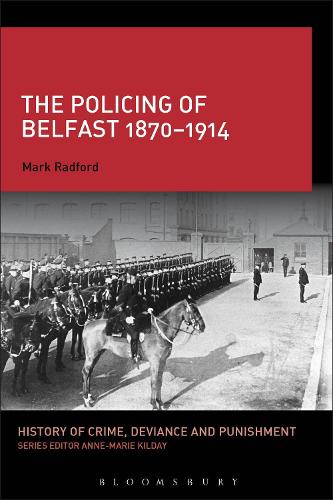
The Policing of Belfast 1870-1914
(Hardback)
Available Formats
Publishing Details
The Policing of Belfast 1870-1914
By (Author) Mark Radford
Bloomsbury Publishing PLC
Bloomsbury Academic
23rd April 2015
United Kingdom
Classifications
Tertiary Education
Non Fiction
European history
Police and security services
363.209416
Physical Properties
Hardback
256
522g
Description
The Policing of Belfast, 1870-1914 examines the Royal Irish Constabulary (RIC) in late Victorian Belfast in order to see how a semi-military, largely rural constabulary adapted to the problems that a city posed. Mark Radford explores whether the RIC, as the most public face of British government, was successful in controlling a recalcitrant Irish urban populace. This examination of the contrast in styles between urban and rural policing and semi-rural and civil constabulary offers an important insight into the social, political and military history of Ireland at the turn of the twentieth century. The book concludes by showing how governmental neglect of the force and its failure to comprehensively address the issues of pay and conditions of service ultimately led to crisis in the RIC.
Reviews
What Mark Radford offers is an important new approach, an exploration of the riots as a law and order problem, from the perspective of the Royal Irish Constabulary (RIC) ... Radford does a fine job of highlighting various institutional and operational factors that hampered the quasi-military RIC force in its civil policing role in Belfast. * Irish Studies Review *
This is a fascinating and very readable account of policing that was, and still is, very different from the rest of the UK. * Police History Society, Newsletter 84 *
Belfast has often been likened to a 'volcano', split by 'seismic' sectarian fissures. The question is: how do you control a volcano Mark Radford's impressive study of the policing of the Belfast 'volcano' between 1870 and 1914 amply demonstrates the sometimes insurmountable problems faced by the Royal Irish Constabulary in trying to manage such a combustible city. But as well Radford examines ordinary policing, outside times of turmoil, when Belfast was in fact a remarkably law-abiding place. This book not only tells us much about the bitter and violent politics of Belfast during a vital half century, but also much about the men from rural Ireland, both Catholic and Protestant, who struggled to make the city liveable for all, regardless of class, culture or creed. The book is highly informative and instructive, but also on occasion surprising, ironic and even sad. * Elizabeth Malcolm, Honorary Professional Fellow, University of Melbourne, Australia *
Mark Radford has written an excellent study of an important subject. His book casts a new light on both policing in Ireland and the history of Belfast. He investigates the work of members of the Royal Irish Constabulary in their everyday duties as well as in their response to the problems of a deeply divided city. This story includes not only sectarian riots but also a police strike in 1907. The police reaction to political events, 1912-14, is well covered. Readers will be impressed by his sure handling of a wide range of sources from parliamentary reports to official police correspondence and diaries. * Emeritus Professor Brian M. Walker, School of Politics, International Studies and Philosophy, Queen's University of Belfast *
Author Bio
Mark Radford is a Tutor in the Department of Continuing Education at Oxford University, UK and a former member of the Regular British Army and Royal Ulster Constabulary.
